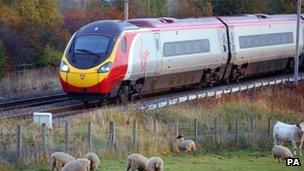West Coast Mainline petition signatures top 100,000
- Published

Virgin has lost its West Coast Mainline contract to rival FirstGroup
An e-petition urging the government to reconsider changing the operator of the West Coast Mainline rail service has attracted more than 100,000 signatures.
The petition, on the Downing Street website,, external now has enough support to trigger a debate in Parliament.
The Labour MP in charge of the Commons transport committee has written to ministers asking them to postpone signing the contract for the service.
But the government has said the deal could be agreed as early as next week.
Virgin Rail lost its bid to continue running the line to rivals FirstGroup.
The e-petition, started by Ross McKillop, says Virgin has "delivered a reliable service for 15 years".
Once a petition has more than 100,000 signatures, the House of Commons backbench business committee must consider whether to grant time for a debate.
Liberal Democrat MP and party president Tim Farron tweeted, external: "Now the @VirginTrains, external petition has reached over 100,000 I think we must debate the issue in Parliament."
The committee is expected to meet next on 4 September.
A Department for Transport spokesman said: "The Leader of the Commons will be referring this petition to the backbench business committee for consideration for Commons debate.
"The earliest contracts can be signed is midnight on Wednesday 29 August."
MP's concerns
First Group, the UK's largest rail operator, will take over the franchise from 9 December and is set to operate the service until 2026.
The firm, which made the highest bid, has said it would bring in key improvements for passengers.
But Labour MP and transport committee chair Louise Ellman - whose constituency on Merseyside is served by the rail line - has sent a letter to Transport Secretary Justine Greening calling for "greater transparency to the process" and an opportunity for her committee to investigate what she calls "a number of concerns".
The MP for Liverpool Riverside wrote: "This franchise will affect millions of passengers and last for up to 15 years. A great deal of public and private money is at stake.
"I have no fixed view on the matter and no preference for any of the bidders. My wish is simply to bring greater transparency to the process."
Public opinion
FirstGroup said it would introduce 11 new 125mph six-car electric trains on the Birmingham-to-Glasgow route and provide more direct services between destinations.
The government says the new trains should add a further 12,000 seats a day on West Coast routes from 2016.
However, the petition says that Virgin "have delivered a reliable service for 15 years and turned the line around".
The signatories call for the government to "seek public opinion in these franchise bids".
"The government should look at more than the highest bidder - look what happened with G4S at London 2012," they add.
'Track record'
Virgin boss Sir Richard Branson has urged people to back the campaign, but insisted it had been set up independently of Virgin by a member of the public.
Addressing those who had signed the petition, Sir Richard said: "All of us at Virgin Trains are overwhelmed and thank you. Let us hope that sense prevails and your views are acted on quickly."
Celebrities including comedian Eddie Izzard, broadcaster Dermot O'Leary and illusionist Derren Brown have called on people to sign.
In response to the petition crossing the 100,000 threshold, a FirstGroup spokesperson said: "We appreciate that Richard Branson is a high-profile celebrity with millions following him personally on social media.
"However, our business is transport - first and foremost. We have a long and proven track record in running rail services and will be delivering better value for taxpayers.
"We look forward to welcoming all customers to their new and improved service from December."
About 31 million passengers travel on the West Coast Mainline every year.
When the backbench business committee meets, an MP has to make the case for a debate and seek support from members from other parties.
The committee then decides whether to allocate the topic, the time for a debate, and where it will be held - either in the Commons chamber itself or in Westminster Hall.
Eight issues raised in e-petitions have been debated in Parliament since the new system was established about a year ago.
- Published21 August 2012
- Published15 August 2012
- Published15 August 2012
- Published15 August 2012
- Published15 August 2012
- Published15 August 2012
- Published15 August 2012
- Published15 August 2012
- Published15 August 2012